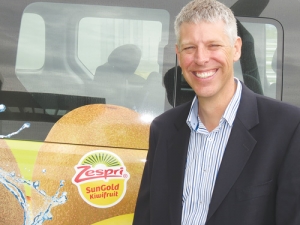MPI Hails Kiwifruit Boom as Horticulture Revenue Surges Past $9 Billion
Ministry for Primary Industries (MPI) Director General Ray Smith is giving a big shout-out to the horticulture sector, especially kiwifruit.
 Zespri chief Lain Jager says the NZ kiwifruit industry must innovate faster than competitors to keep ahead.
Zespri chief Lain Jager says the NZ kiwifruit industry must innovate faster than competitors to keep ahead.
The race to innovate faster than our competitors is one we must win, says Zespri chief executive Lain Jager.
He told the recent kiwifruit innovation symposium that doing the things we do today better will not be good enough to keep the industry up with competitors.
It's no use thinking about the status quo when thinking about the future, Jager says.
"Our competitors will be breeding new cultivars and bringing new varieties to the market. They will devise new production systems and new supply technologies," Jager says. "We are at real risk of disruption. The choice we must make is between being disrupted by our competitors or disrupting them and I know what I'd prefer."
Jager says the pace of change has increased especially in the last 20 years, but now it is accelerating at an even greater rate.
"Technology is driving change – robotics, new production systems, better pest control and greater computing power.
"That's positive because there are opportunities inherent in that. But there are enormous risks, in particular the risk of being disrupted by other industries that come up with new ways of doing things."
Jager says what is needed is 'transformational innovation' which may be outside some people's comfort zones. This requires embracing the concept of 'unbelief' and thinking about an innovation system completely different from what exists today.
Worldwide emerging macro trends include more melons and berries are appearing in markets: consumers see these as offering flavour and fruit 'ready to eat'... they don't want to take it home and find it is too hard or too soft. They want to be able to take it home and eat it," Jager explains.
"These macro trends enable us to gain insights into what's working and what is meaningful for consumers. And we need to be able to breed varieties of kiwifruit which meet those objectives."
High quality science is fundamental to the success of Zespri, Jager says. Science is a crucial tool in the innovation process and in providing quality data to consumers about products.
Maori co-branding
Zespri is now working with Maori on a co-branding exercise, Lain Jager says.
Maori orchards produce about 10% of the national kiwifruit crop and this is expected to increase. Maori are very supportive of the integrated industry structure but are also keen to put their own stamp on the marketing of kiwifruit providing it can link with Zespri's objectives.
"Maori are telling us that the origin of the fruit, the land, the people and where the fruit comes from is very important to them. They are looking at ways to represent that view in the market and we support working with Maori on co-branding initiatives."
Zespri is now doing market research to see if such a concept resonates with consumers.
Fonterra’s impending exit from the Australian dairy industry is a major event but the story doesn’t change too much for farmers.
Expect greater collaboration between Massey University’s school of Agriculture and Environment and Ireland’s leading agriculture university, the University College of Dublin (UCD), in the future.
A partnership between Torere Macadamias Ltd and the Riddet Institute aims to unlock value from macadamia nuts while growing the next generation of Māori agribusiness researchers.
A new partnership between Dairy Women’s Network (DWN) and NZAgbiz aims to make evidence-based calf rearing practices accessible to all farm teams.
Despite some trying circumstances recently, the cherry season looks set to emerge on top of things.
Changed logos on shirts otherwise it will be business as usual when Fonterra’s consumer and related businesses are expected to change hands next month.

OPINION: Here w go: the election date is set for November 7 and the politicians are out of the gate…
OPINION: ECan data was released a few days ago showing Canterbury farmers have made “giant strides on environmental performance”.